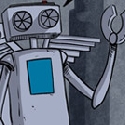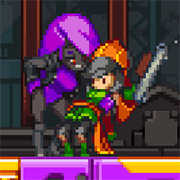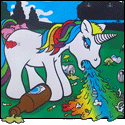|
Yeah - the reason why Jack hosed up so badly wasn't because he was trying something new, he was throwing himself in without any understanding of why Christmas is the way it is. Like a guy who decided to jump onto riding a motorcycle without learning to drive first because he really, really wanted to do it. This is really notable when he was trying to teach the rest of the Halloween Townies in "Town Meeting Song" - even as he corrects some of their misconceptions he's revealing his own. And there's also the fact instead of asking for permission or offering to help "Sandy Claws", he immediately goes to kidnap him.
|
|
|
|

|
| # ? Jun 4, 2024 12:56 |
|
He's the bad guy. It's in a scorpions nature to sting, blah blah blah, but the moral of the fable isn't that you admonish the scorpion.
|
|
|
|
K. Waste posted:And, yet, Ralph's pursuit of "shallow self gratification" is ultimately the only thing that teaches the assholes who treat him like poo poo the profound lesson in... not treating him like poo poo. [/i]. What are you talking about? Ralph's pursuit of the medal does nothing but make everything worse. It spreads the bugs to other games. It almost gets his home game unplugged. No one accepts Ralph as a result of his quest for the medal. It's also weird that you keep coming back to Ralph being stopped by customs or whoever they were. I mean, do we see any other bad guys being singled out? I don't think so. We see exactly one character get stopped by customs, and it's a character who is in fact carrying stuff he shouldn't be. Not exactly great evidence of some kind of villain profiling.
|
|
|
|
Wittgen posted:What are you talking about? Ralph's pursuit of the medal does nothing but make everything worse. It spreads the bugs to other games. It almost gets his home game unplugged. No one accepts Ralph as a result of his quest for the medal. Are you forgetting the whole part where he unintentionally uncovers political corruption in one of the games and thus assists in the deposing of a monomaniacal despot and the ending of discrimination against Vanellope? These are all things that don't happen if Ralph decides, "Eh, I'll learn to live with what I got." Yeah, I get it, his actions threaten to bring down the game, but how else is it supposed to be demonstrated dramatically that his very presence is critical to the game surviving? He might as well have gone on strike. Also, yeah, we really gotta worry about a homeless guy eating contraband cherries. There's not, you know, massive political corruption and classist/racist discrimination to worry about. (Actually, I suspect the war on power-ups is just a thin excuse for perpetuating the dominant order. I mean, everyone knows that Mario and Luigi are on loving shrooms.)
|
|
|
|
Video game quarantine is serious business. Just look at what happened when they let
|
|
|
|
K. Waste posted:Are you forgetting the whole part where he unintentionally uncovers political corruption in one of the games and thus assists in the deposing of a monomaniacal despot and the ending of discrimination against Vanellope? These are all things that don't happen if Ralph decides, "Eh, I'll learn to live with what I got." Yeah, I get it, his actions threaten to bring down the game, but how else is it supposed to be demonstrated dramatically that his very presence is critical to the game surviving? He might as well have gone on strike. Are you forgetting that the only reason anything happened about the corruption and Vanellope's treatment was because Ralph voluntarily chose to go back and do something about it? Yes, we're shown that things are bad, and that the "good guys" (the Nicelanders, King Candy, even Felix) have internalized the narriative of their games to the point that they believe they are justified in discriminating against nearly everyone else, but these problems aren't actually addressed until Ralph literally casts his sin away. You seem to be treating Ralph's journey as being soley oriented on proving his own worth, but he takes two journeys in the two acts of the movie and they are fundamentally different. When he first leaves his game, his actions are moved by anger, resentment, and selfishness; he isn't interested in talking it out or addressing the fundamental problems of his game, he just wants to be on top, as his daydream when he recieves the medal indicates (him in the penthouse, and Gene in the mud). This attitude, while understandable given his treatment up to that point in the story, is shallow and vindictive and doesn't actually solve any problems; the story makes clear that he doesn't care about any problems but his own at that point. But the Ralph who sets out again in act two is a different Ralph entirely, with different motivations; he's no longer interested in getting his own back, he wants to help Vanellope, and only in that mindset is the systematic corruption outed and his mistakes fixed. First act Ralph sets out in myopic selfishness (the same as everyone else seems to exhibet) and screws everything up, Second act Ralph sets out in compassion and becomes a hero. Again, the Christian Message is plain as day: greed and selfishness destroy the world, compassion and community save it.
|
|
|
|
Gosh, one might even come to think that the moral lessons of children's films are so basic and universal that they fit into multiple frameworks. Thank god you guys are here to claim that your particular perspective has a monopoly on "act good and do good things."
|
|
|
|
|
|
|
|
resurgam40 posted:
|
|
|
|
Multiple viewpoints can be valid, but people can still be wrong about things. For example, I think K. Waste's interpretation of RiW bad guys as an oppressed social class is ill considered, but I wouldn't call it invalid. It has merit. On the other hand, his claim that everything Ralph does is thanks to his quest for the medal is just wrong. Like resurgam pointed out, the good stuff he did only happened after he shifted gears. It would be like claiming everything Luke Skywalker does in Star Wars is a result of his quest to retrieve runaway R2-D2. Even if it would be very convenient in my interpretation to have Luke's arc completely based on blind obedience to Uncle Ben's patriarchal authority, it's a ridiculous claim.
|
|
|
|
resurgam40 posted:
Haha, you don't have to apologize to some shithead dismissing your read of the film because he's too dumb to understand implied subjectivity. Keep on keepin' on.
|
|
|
|
Mechafunkzilla posted:Haha, you don't have to apologize to some shithead dismissing your read of the film because he's too dumb to understand implied subjectivity. Keep on keepin' on.
|
|
|
|
I don't always agree with K. Waste, but really he's a pretty good poster that at least puts in the effort of justifying his opinions.
|
|
|
|
FactsAreUseless posted:Did you read the post I wrote in response where I addressed that? Good work. You don't really understand why I'm criticizing you.
|
|
|
|
Mechafunkzilla posted:You don't really understand why I'm criticizing you.
|
|
|
|
FactsAreUseless posted:You think I'm saying his reading is invalid because I don't get his implied perspective, namely that he's making a Christian criticism. I'm saying his reading is valid, but saying "therefore this other perspective cannot apply" isn't. "Implied subjectivity" isn't some incredibly complex concept only Big Movie Fans get. Pointing out why you think someone else's read is inconsistent or doesn't hold water isn't the same thing as "pretending yours is the only valid one". What you're basically suggesting is that nobody should engage with anyone else in a critical way, which is asinine.
|
|
|
|
resurgam40 posted:Are you forgetting that the only reason anything happened about the corruption and Vanellope's treatment was because Ralph voluntarily chose to go back and do something about it? Yes, we're shown that things are bad, and that the "good guys" (the Nicelanders, King Candy, even Felix) have internalized the narriative of their games to the point that they believe they are justified in discriminating against nearly everyone else, but these problems aren't actually addressed until Ralph literally casts his sin away. You seem to be treating Ralph's journey as being soley oriented on proving his own worth, but he takes two journeys in the two acts of the movie and they are fundamentally different. When he first leaves his game, his actions are moved by anger, resentment, and selfishness; he isn't interested in talking it out or addressing the fundamental problems of his game, he just wants to be on top, as his daydream when he recieves the medal indicates (him in the penthouse, and Gene in the mud). This attitude, while understandable given his treatment up to that point in the story, is shallow and vindictive and doesn't actually solve any problems; the story makes clear that he doesn't care about any problems but his own at that point. But the Ralph who sets out again in act two is a different Ralph entirely, with different motivations; he's no longer interested in getting his own back, he wants to help Vanellope, and only in that mindset is the systematic corruption outed and his mistakes fixed. First act Ralph sets out in myopic selfishness (the same as everyone else seems to exhibet) and screws everything up, Second act Ralph sets out in compassion and becomes a hero. Again, the Christian Message is plain as day: greed and selfishness destroy the world, compassion and community save it. There is no version of this film that exists where Ralph's climactic act of redemption isn't dependent upon his initial act of defiance. If Ralph doesn't pursue the Hero's Medal, we don't have a story. We don't have redemption for himself or Vanellope, we just have stagnation in the same complacent discrimination as exists in the film's beginning. Is what Ralph pursues materialistic, selfish, and myopic? Yeah. Is it an accurate reflection of the hypocrisies latent in his own society, and does it ultimately bring these hypocrisies to the tipping point at which it becomes impossible to ignore them any longer and necessary for him to have the redemptive rejection of the Hero's Medal and takedown of the 'false king'? Abso-loving-lutely. I'm not even disagreeing with you that the film is more interested in 'teaching Ralph a lesson' than it is in correcting the structural inequality of its own society. But I find your implication that the prioritization of the former over the latter can be interpreted positively from a Christian theological perspective kinda spiritually offensive at best. Christ was not more interested in the shaming of the individual sinner than he was in the accusation against social and moral hypocrisy and his prophecy of its apocalyptic destruction. More important than the petty sin of the prostitute or the tax collector or even the Roman centurion serving as the arm of racist oppression was attacking the basic philosophies of discrimination and non-compassion that defined society as a whole and necessitated the apocalyptic intervention of the messiah to usher in a unified kingdom founded on love. Ironically, the scenario in which the CyBugs run unchecked and assimilate the entire arcade is actually closer to what Christ would want than what the film gives us, where the focus on vapid materialism and staging of paradigmatic injustice through the Wreck-It Ralph video game continues virtually unaltered (by which I mean, in no way that makes any substantive difference to the kids playing the game and getting the message). Let's talk about the CyBugs for a minute, since, yeah, Ralph's unintentional loosing of them through his selfish act threatens the apocalypse of the entire known world of the arcade. The question I have is... Why does Gepetto the arcade manager have a game in his establishment that he knows can potentially infect and decommission all the other games? Does he not know this? Did the developers not tell him? Did they not know this? Did they approve this product without understanding the full social consequences of its being released in this state? Furthermore, why do the other video game characters outside of that game not know this? Shouldn't such potential of social and ecological devastation be made a matter of public knowledge at the very least? Why is there no oversight for poo poo like this? And, furthermore, why does the movie not care? Starship Troopers is occurring every day right next door to these other games, and nobody cares because, "Eh, it's not my problem. I'm supposed to just stay where I am and not question anything." It's not hard to see how this social complacency invariably leads to the exact kind of discrimination that makes Ralph so desperate and sets off the chain reaction that threatens to spoil the entire social structure of the arcade. The thing that I find extremely questionable about the Christian moral interpretation of Ralph's arc of 'redemption' is that it prioritizes shaming him as a product of his environment over the recognition of just how hosed up and corrupt and nightmarish his environment is, merely because it's 'just a game.' I'm sorry, games have social consequences and teach social values, and in the case of Wreck-It Ralph, these children are taught every day to value the myopic pursuit of temporary virtual success over justice and love, whether it's the fact that they play Fix-It Felix defending modern society from the hillbilly monster whose home its urban development destroyed, soldiers being lead to the slaughter against CyBugs whose planet we are invading, or, most ironic of all, all the other reindeer racers who won't let poor Rudolph/Vanellope join in their games. As selfish and myopic as what Ralph does, the institutional oppression and corruption and ignorance that pervades his society is ten fold loving worse. The film is grossly materialistic, and it's certainly anti-Christian. FactsAreUseless posted:Viewing from one particular perspective is fine, but pretending it's the only valid one is silly. K. Waste, for instance, does it constantly because he is bad at posting. No one is pretending that their perspective is the only valid one except you, given that you've elected yourself critic of conversation. I'm actually far more respectful and interested in resurgame40's defense of his spiritual reading of Wreck-It Ralph in a topic-appropriate forum than you. ungulateman posted:Video game quarantine is serious business. Just look at what happened when they let In Turbo's defense, his game was old and stupid.
|
|
|
|
K. Waste posted:you've elected yourself critic of conversation.
|
|
|
|
FactsAreUseless posted:The phrase you want is "Judge Judy and executioner." You can't use a Hot Fuzz reference to misdirect my rage. Okay, yes you can.
|
|
|
|
.
|
|
|
|
That totally was in Daria also.
|
|
|
|
K. Waste posted:Let's talk about the CyBugs for a minute, since, yeah, Ralph's unintentional loosing of them through his selfish act threatens the apocalypse of the entire known world of the arcade. The question I have is... Why does Gepetto the arcade manager have a game in his establishment that he knows can potentially infect and decommission all the other games? Does he not know this? Did the developers not tell him? Did they not know this? Did they approve this product without understanding the full social consequences of its being released in this state? Furthermore, why do the other video game characters outside of that game not know this? Shouldn't such potential of social and ecological devastation be made a matter of public knowledge at the very least? Why is there no oversight for poo poo like this? And, furthermore, why does the movie not care? Starship Troopers is occurring every day right next door to these other games, and nobody cares because, "Eh, it's not my problem. I'm supposed to just stay where I am and not question anything." It's not hard to see how this social complacency invariably leads to the exact kind of discrimination that makes Ralph so desperate and sets off the chain reaction that threatens to spoil the entire social structure of the arcade. Consider this: Fix-It Felix Jr., is clearly a pastiche of Donkey Kong, which means two things: firstly, that it most likely has a looping series of levels with escalating difficulty and is designed to be, in-fact, unwinnable for the player, and secondly, that it probably has some kind of kill screen, meaning that if the player exceeds a certain structural limit of the game's programming that it will cause a cataclysmic failure and an automatic game-over, the occasion of which is the closest thing the game has to an ultimate victory state. Think about what this would actually mean for the sentient actors within the game. Their experience as depicted in the film is that whenever the game starts, Ralph gets pissed, storms up the building and wrecks it and then tries to thwart Felix from repairing the damage that he causes. Felix is ultimately able to do so and then Ralph is pitched from the roof of the apartment, and Felix gets a medal. However, the "reality" of the game would be that this cycle is repeated again and again, with each round giving more advantages to Ralph. He'd be able to move faster, get more bricks, do more damage. In 99.5% of all occurrences, the cycle ends with Ralph's victory, presumably destroying the building and regaining his native habitat. The only other option is the kill screen. Imagine how this is experienced by the game characters. Their world is one where no matter how hard Felix works, Ralph will eventually win, and the best case scenario is that he does so well that he triggers the end of the world, which either strikes him down on the spot (like in Donkey Kong) or rips his universe in half (like the split screen in Pac-Man). The way I see it, there are only two ways that they would cope with such a world: 1.) All consuming existential dread 2.) A mutual understanding of their roles within the game world Two other narratives explore both of those concepts: Reboot, and Nintendo's Mario franchise For Reboot, the characters are not pitted against each other in the games but against the Player, and if they lose they are converted into seemingly mindless slugs, as well as getting a huge chunk of their home erased from existence. It's a hostile scenario where the characters relate to the games not as work but as matters of life and death. Fortunately the person who owns their computer is pretty terrible at games and always get beaten by the NPCs. Nintendo has basically gone on record as saying that they view the cast of their Mario games as actors taking on different roles in a variety of games. Accordingly Mario Galaxy and Mario Kart and Mario Tennis and Super Mario RPG and Mario Party are so much stand alone universes but contained within the same meta-universe as the arcade games in Wreck-It Ralph. There is an understanding that Bowser isn't inherently bad, nor is Mario inherently good-- they are just actors, and there are no hard feelings as a result. I love Wreck-It Ralph, but this is the key reason why it's not as good as Toy Story. Pixar, even from the first film, had a very clear undstanding of the society that they were creating, and it had very few rules or restraints. There was no reason why the toy's couldn't reveal themselves to humans-- they wouldn't die or become frozen, rather they chose not to because it would upset them (as seen with Sid) and cause so much havoc in the human world that instead it's simply understood that this is the best way for everyone. In Wreck-It Ralph, they are plagued with the exact problem that you pointed out. Games can go haywire, infect other games and cause actual observable problems in the human world which the game makers would no doubt be aware of-- so do they know that the characters they are creating are thinking, feeling individuals? If they don't then they are blind idiot gods, ignorant of the life that they are creating and therefore capricious in their dealings with them; and if they are then they are cruel gods by presenting their creations with violent, unwinnable scenarios. That's probably too many words about Wreck-It Ralph.
|
|
|
|
axleblaze posted:I don't always agree with K. Waste, but really he's a pretty good poster that at least puts in the effort of justifying his opinions. I agree. He's said a few things recently that made me see some films in a new light, and/or showed me why audiences have reacted to those films in certain ways. I'm really getting into this latest discussion.
|
|
|
|
Strange Matter posted:That's probably too many words about Wreck-It Ralph. It's not, and this is a great post. It ironically touches back on FactsAreUseless's point that "the moral lessons of children's films are so basic and universal that they fit into multiple frameworks." Except it's not just that the basic rhetorical frameworks of children's entertainment makes them contextually pliable; it's that their rhetorical simplicity - especially when coupled with such overt attempts at sprawling, fantasy world-building as we get in Wreck-It Ralph - ultimately betrays compounding internal contradictions that kids predominantly don't care about but should effect the way adults interact with the text, regardless of what this interpretation ultimately is. Like, I respect resurgam40's reading even though I disagree with it because at least it tacitly compartmentalizes the contradictions of the film in a way that make rhetorical sense from his/her particular philosophical perspective.
|
|
|
|
The politics of unambitious films that have been consumed by hundreds of millions of people are kind of inherently interesting.
|
|
|
|
I think in the end my take on Wreck It Ralph is it's a extremely enjoyable film whose pieces don't all fit together very well. I can't really disagree with K Waste on alot of stuff because they really don't' focus on some important things that they themselves bring up because it would kill the pacing and in the end they just don't care all that much. In the end it's true that Ralph being treated like a second class citizen is never really properly addressed and it's annoying that the movie treats his "wanting to not be treated like garbage" as a greedy quest. On the other hand to really explore this they'd have to focus on characters that the movie just isn't really about so that subtext is just sort of ignored to make things flow. One thing I wonder is if Ralph isn't the way he is because of age. I don't think Ralph started being bitter at his place in life but it's something that developed after years and years and years of being a bad guy.While most of the characters are the characters they were when the game first went on, Ralph has changed over the years. You wonder if 20 years down the line if the bugs the the shooter game will start questioning their role and not be the mindless force of destruction they were created to be.
|
|
|
|
quote:One thing I wonder is if Ralph isn't the way he is because of age. I don't think Ralph started being bitter at his place in life but it's something that developed after years and years and years of being a bad guy.While most of the characters are the characters they were when the game first went on, Ralph has changed over the years. You wonder if 20 years down the line if the bugs the the shooter game will start questioning their role and not be the mindless force of destruction they were created to be. The CyBugs are already basically like Jack in A Nightmare Before Christmas. They're not evil invaders, they just wanna give everyone a really big hug. EDIT: Some minor things that would have improved Wreck-It Ralph dramatically without killing the pacing: 1) Expand upon Strange Matter's idea of Felix facing his own kind of existential dread at never truly being able to win the game, and have him be less of a dumb rear end in a top hat and actually extend himself to try to be friends with Ralph as 'actors' who share responsibility in bringing the drama of the game to life. Have Ralph rebuff this as someone who has been thoroughly indoctrinated by the social paradigms of the arcade. 2) Similarly, have Ralph and the other villains be more villainous, the Bad-Anon characters encouraging him in his hardened prejudice against Felix and the Nicelanders. Making Ralph a meaner-spirited character makes his becoming a hero to Vanellope more surprising and dramatically effective. (In other words, make it more like Shrek.) 3) Have Calhoun, upon discovering the hive, decide to lockdown Sugar Rush, Ripley-style. Jingoistic, unaware, and uninterested in the particulars of the game which could help destroy the CyBugs, she 'quarantines' Sugar Rush and refuses to let the other characters go, believing that they either could already be assimilated by the CyBugs or potential glitches like Vanellope and King Candy/Turbo. Have Felix and Ralph team up against Calhoun and save the Sugar Rush characters, Felix ushering them to asylum, uncertain of the fate of his own game, and Ralph bittersweetly heading back to Diet Cola Mountain in the Hail Mary attempt to save Sugar Rush. K. Waste fucked around with this message at 20:47 on Dec 31, 2014 |
|
|
|
K. Waste posted:I'm not even disagreeing with you that the film is more interested in 'teaching Ralph a lesson' than it is in correcting the structural inequality of its own society. But I find your implication that the prioritization of the former over the latter can be interpreted positively from a Christian theological perspective kinda spiritually offensive at best. Christ was not more interested in the shaming of the individual sinner than he was in the accusation against social and moral hypocrisy and his prophecy of its apocalyptic destruction. More important than the petty sin of the prostitute or the tax collector or even the Roman centurion serving as the arm of racist oppression was attacking the basic philosophies of discrimination and non-compassion that defined society as a whole and necessitated the apocalyptic intervention of the messiah to usher in a unified kingdom founded on love. Ironically, the scenario in which the CyBugs run unchecked and assimilate the entire arcade is actually closer to what Christ would want than what the film gives us, where the focus on vapid materialism and staging of paradigmatic injustice through the Wreck-It Ralph video game continues virtually unaltered (by which I mean, in no way that makes any substantive difference to the kids playing the game and getting the message). To your point regarding Christianity, I absolutely agree that Christ was more interested in pointing out the hypocrisies and cruelties of the authority of the time rather than individual sins; he (or the person who created him) was extraordinarily prescient in his belief that the response to societal ills was to change society rather than admonish those suffering from it, a lesson far too few people learn from his story. But as before, you seem to be arguing that while Ralph changes over the story, the society he lives in does not, to which I can only reply...buh? The change of society is integral to the entire story; it mirrors the development of Ralph and makes it meaningful that he changed. No, the games did not change a lot outwardly in mechanics*, but it's obvious that Ralph is in a different place than he was in the beginning. He actually receives recognition for his efforts (notice that the cake is brought out to him, rather than him going up to the penthouse), nobody treats him as a pariah anymore, and he has a true friend in another game, all of which shows what he was really after in his quest is compassion, which he gets. There's also the fact that the world of the game does fundamentally change within the story: beyond the 'false king' (who serves as a foil to Ralph in never learning to love others and depart from selfishness) being deposed and the rightful ruler being installed, we have a marriage between characters of different games (which characters from other games can visit) and we have the characters from an old game integrated into a current one! If what you said about society is true, Q*Bert and his friends would be totally hosed, they would be "homeless" and would have to depend on the kindness of strangers forever, and there'd be naught anyone could do about it. And yet they were integrated more or less seamlessly into Ralph's game without anyone saying boo; it's portrayed that it actually increased the games popularity. If compassion can be shown to have such beneficial results beyond society, is that society corrupted beyond repair? Perhaps the problem you have with the setting is that the intrinsic unfairness about this society is that its wrongs were never directly addressed by the film, and that the main perpetrators of the biggest offenses (i.e. the Nicelanders) were never called out, never shown to go through the same journey and realization of their own culpability in the problem. And truth be told, I have nothing to say to that; that is a problem. But there have been other children’s stories that had the same problem (there were the ants in A Bug's Life that were underservedly harsh on Flick for his inventions when he was only trying to help, and not only were they not called out, they were proven as right in doing so), and honestly "people being assholes to you doesn't justify your being an rear end in a top hat" isn't a bad lesson for kids to learn, so I kinda gloss over that part. As to your point about how this is all for selling a game to gamers for money, well, I have nothing to say to that either, except the crass commercialism of arcades isn't a story the movie wanted to tell, so...  It's not that I don't see where your coming from in your overall interpretation of Wreck It Ralph, because I do, and I even agree with your point that the presentation of the world and the way it works undercut the overall moral (as well as Strange Matters excellent post regarding the mechanics of the arcade and the implications of sentient life within videogames, a problem I suspect came about with treating video game characters exactly the same as toy characters and not following the implications through). It's just that your interpretation seems to be based on a version of the movie in which Ralph destroys Vanellope's car, goes back to his game, apologizes for his absence and accepts his lot as a bad guy and deserves to be poo poo on, without ever getting to the second act. *with the exception of adding Q*Bert to the Fix It Felix game, more on that later
|
|
|
|
K. Waste posted:Some minor things that would have improved Wreck-It Ralph dramatically without killing the pacing: That kinda seems like it would make it an entirely different movie, though. I think the only real problem I have with the story is that it wants to be a story where the game characters are just like actors in a play, but at the same time the play is also their actual lives and there's no difference between their personalities "on stage" and when the game is not active. On top of that, not even that is really consistent as the story progresses. axleblaze posted:One thing I wonder is if Ralph isn't the way he is because of age. I don't think Ralph started being bitter at his place in life but it's something that developed after years and years and years of being a bad guy.While most of the characters are the characters they were when the game first went on, Ralph has changed over the years. You wonder if 20 years down the line if the bugs the the shooter game will start questioning their role and not be the mindless force of destruction they were created to be. It's weird, because they don't seem to be portrayed as having the same level of sentience that the main characters do, and you'd think they'd all be equally sentient since they're all just video game characters, presumably following a set of instructions Unless it's some kind of layered thing where only the main PCs and NPCs are the ones that are self-aware and able to break their instructions, and the nameless multiple-instanced objects are comparatively mindless... ...and I've put way too much thought into this. raditts fucked around with this message at 21:05 on Dec 31, 2014 |
|
|
|
okay, this Wreck-It-Ralph discussion is fascinating, but can we talk about how utterly devastating The Tale of the Princess Kaguya is? it just utterly wrecked my poo poo, man. And I don't know if I've ever seen an animated film as strikingly beautiful. I mean, goddamn. 
|
|
|
|
Here's how to improve Wreck-It Ralph in one step. 1. More Sonic
|
|
|
|
Strange Matter posted:You've actually highlighted what I think one of the film's big missteps, which is that it tries to be Toy Story without fully understanding the implications of the social structure that they created. It's a great idea but it lacks the clarity of vision that Pixar had. I disagree. I think that Toy Story's inherent social/cultural structure is much less logical than that established in WIR. However, Toy Story smartly ignores it. It's not the point of the film. WIR uses it as the cornerstone of its theme so the cracks are far more conspicuous.
|
|
|
|
resurgam40 posted:But as before, you seem to be arguing that while Ralph changes over the story, the society he lives in does not, to which I can only reply...buh? The change of society is integral to the entire story; it mirrors the development of Ralph and makes it meaningful that he changed. No, the games did not change a lot outwardly in mechanics*, but it's obvious that Ralph is in a different place than he was in the beginning. He actually receives recognition for his efforts (notice that the cake is brought out to him, rather than him going up to the penthouse), nobody treats him as a pariah anymore, and he has a true friend in another game, all of which shows what he was really after in his quest is compassion, which he gets. There's also the fact that the world of the game does fundamentally change within the story: beyond the 'false king' (who serves as a foil to Ralph in never learning to love others and depart from selfishness) being deposed and the rightful ruler being installed, we have a marriage between characters of different games (which characters from other games can visit) and we have the characters from an old game integrated into a current one! If what you said about society is true, Q*Bert and his friends would be totally hosed, they would be "homeless" and would have to depend on the kindness of strangers forever, and there'd be naught anyone could do about it. And yet they were integrated more or less seamlessly into Ralph's game without anyone saying boo; it's portrayed that it actually increased the games popularity. If compassion can be shown to have such beneficial results beyond society, is that society corrupted beyond repair? Let's un-package the ending, because as a montage, it actually does a good job of summarizing exactly what I'm objecting to when I say "nothing changes": https://www.youtube.com/watch?v=LSylJkV-4yg The marriage between Calhoun and Felix is actually a perfect summation of where I think the film runs around in an attempt to justify the circuitous, problematic logic of, not just video games, but by extension all mediated staging of paradigmatic narratives, rather than how people come to engage with problematic aspects of culture without essentially committing themselves to narratives that demonize, marginalize, or otherwise degrade them, and don't actually reflect their basic interests. Wreck-It Ralph gives us one version of the answer which it frames as unambiguously negative: the reckless breaking of rules to assert one's power and legitimacy in a culture governed by materialism. At the same time, it's only by engaging in exactly this sort of behavior that anything approaching 'progress' occurs in the arcade. Ralph's selfish, defiant action ends discrimination against Vanellope, empowers him to expand housing and employment opportunities for homeless/vagrant characters, and allows him to engage in a healthy working relationship with his 'co-stars.' Without stating it explicitly, the film recognizes that some form of radical action is necessary in order to not only restore dignity to an individual, but to extend greater justice to an entire culture. My concern is, "What is a culture apart from how it expresses itself and the values upon which it is predicated?" If we go with raddits' and Strange Matter's interpretation, that these characters are essentially unwilling participants in narratives arranged by uncaring gods, then the following is only mitigated slightly in that it means these characters are purely pathetic--Ralph, Felix, and everyone else are compelled to live out the same indignant narratives over and over again for the chump change that will keep them from being summarily 'unplugged' and abandoned. Yeah, the citizens of the arcade are happier, and the consumers are happier to indulge this more liberal enterprise. But, rendered explicitly through the marriage of old school Felix and new school Calhoun (a plot twist that seems to exist solely to pander to video game peeps who even bother debating about which period in gaming was better), the narratives that this society traffics in to stay afloat haven't actually become significantly less intolerant or prejudiced. Fix-It Felix, Jr. is still essentially the story of an urban development that destroys the home and uproots its original inhabitant but told in such a way that this character is an abhorrent hick whose defeat is necessary to the progress of society for the 'real' people. On the other hand, Hero's Duty continues to indoctrinate players with the promise of glory for indiscriminately exterminating the massive, dark, unambiguously repulsive Other. The truth is that these characters don't exist apart from the materialistic and prejudicial social values that their consumers endorse implicitly, that they are all just biding their time before they either rust away from not being played or crap out from a simple bug. Obviously, it's a kids movie. It's supposed to be naive. But what good is this naivety if the possibilities it suggests are all constrained within tolerance of the same repetitive paradigms which Wreck-It Ralph instructs its viewers to value implicitly, even if there is oppression? Basically, what I'm asking is... If I don't get to play Ralph at the end of the day, then what's the point? When are these characters going to seize the means of production, realize just what a lovely situation their prejudicial paradigms and corrupt gaming authorities have put them in, and build the truly new game? Spatula City posted:okay, this Wreck-It-Ralph discussion is fascinating, but can we talk about how utterly devastating The Tale of the Princess Kaguya is? Best film of 2013, as far as I'm concerned. K. Waste fucked around with this message at 21:48 on Dec 31, 2014 |
|
|
|
Waffleman_ posted:Here's how to improve Wreck-It Ralph in one step.
|
|
|
|
Waffleman_ posted:1. More Sonic FactsAreUseless posted:So you'd say that Sonic's scene went too fast? "Wikipedia posted:Due to the number of scenes that would be offensive to Western audiences, the following scenes were edited or removed from the 1999 VHS release of the film: What is it with the Japanese and jokes about inadvertent sexual harassment/assault?
|
|
|
|
K. Waste posted:What is it with the Japanese and jokes about inadvertent sexual harassment/assault? Japan has real big issues with sexism in their culture, partially due to women getting lots of rights due to need after the war rather than a social rights movement, that they have no interest in confronting or changing anytime soon.
|
|
|
|
FactsAreUseless posted:So you'd say that Sonic's scene went too fast? I also want an explanation as to why he was even in an arcade when pretty much all of his games have been on home systems. Like, unless they had Sonic the Fighters or that weird Japanese treadmill game.
|
|
|
|
K. Waste posted:My concern is, "What is a culture apart from how it expresses itself and the values upon which it is predicated?" If we go with raddits' and Strange Matter's interpretation, that these characters are essentially unwilling participants in narratives arranged by uncaring gods, then the following is only mitigated slightly in that it means these characters are purely pathetic--Ralph, Felix, and everyone else are compelled to live out the same indignant narratives over and over again for the chump change that will keep them from being summarily 'unplugged' and abandoned. Yeah, the citizens of the arcade are happier, and the consumers are happier to indulge this more liberal enterprise. But, rendered explicitly through the marriage of old school Felix and new school Calhoun (a plot twist that seems to exist solely to pander to video game peeps who even bother debating about which period in gaming was better), the narratives that this society traffics in to stay afloat haven't actually become significantly less intolerant or prejudiced. Fix-It Felix, Jr. is still essentially the story of an urban development that destroys the home and uproots its original inhabitant but told in such a way that this character is an abhorrent hick whose defeat is necessary to the progress of society for the 'real' people. On the other hand, Hero's Duty continues to indoctrinate players with the promise of glory for indiscriminately exterminating the massive, dark, unambiguously repulsive Other. The truth is that these characters don't exist apart from the materialistic and prejudicial social values that their consumers endorse implicitly, that they are all just biding their time before they either rust away from not being played or crap out from a simple bug. .... I concede this point. There's not a thing I can say a thing about it. I'd like to be able to pull out some pithy thing that refutes this, but as you say, they're all still in an arcade. They can't just up and change their roles, they cant use their games to tell new, evolving stories... They're still presenting the same drat stories to the same drat kids for the same drat quarters; this is not portrayed as changeable. And the goals of these games, as ever, is the accumulation of points in whatever form. So maybe the thing that rankles here is the creator's near-slavish dedication to video games as they are or were in ages past (I mean, who goes to the arcade anymore, really?), rather than exploring the mechanics of their world and presenting something that fit the themes of the story a little more. They were plainly not as interested in world building as they were in creating a palatable story that has good resale value, and if we look at it through such a lens, it is a good movie with clashing values that ... is fundamentally un-Christian. Man, too much thought about themes and world building just ruins kiddy movies, I tells ya. Hell with it, I was always more interested in character development and dialogue than setting anyway. Anyhow, happy new year, thread. I don't know of any projects I'm interested in upcoming, but I still have to see stuff like princess Kaguya or Song of the Sea yet, so there's that.
|
|
|
|
Waffleman_ posted:I also want an explanation as to why he was even in an arcade when pretty much all of his games have been on home systems. Like, unless they had Sonic the Fighters or that weird Japanese treadmill game. Actually, the opening scene of the movie does showcase a Sonic the Fighters machine.  
|
|
|
|

|
| # ? Jun 4, 2024 12:56 |
|
The main message I take from WIR is "You are not your job." Everyone finds some meaning outside of their preassigned position, even if they don't overthrow the entire system in the process- again, this is one of those cases where it may not be properly Marxist to show people being happy without a Revolution but I can't even pretend that's valid formal criticism anymore.
|
|
|




























